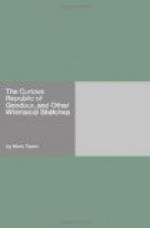For if he were sitting under the glory of the Throne, and the keeper of the keys admitted a Benjamin Franklin or other labouring man, that “friend,” with his fine natural powers infinitely augmented by emancipation from hampering flesh, would detect him with a single sniff, and immediately take his hat and ask to be excused.
To all outward seeming, the Rev. T. De Witt Talmage is of the same material as that used in the construction of his early predecessors in the ministry; and yet one feels that there must be a difference somewhere between him and the Saviour’s first disciples. It may be because here, in the nineteenth century, Dr. T. has had advantages which Paul and Peter and the others could not and did not have. There was a lack of polish about them, and a looseness of etiquette, and a want of exclusiveness, which one cannot help noticing. They healed the very beggars, and held intercourse with people of a villainous odour every day. If the subject of these remarks had been chosen among the original Twelve Apostles, he would not have associated with the rest, because he could not have stood the fishy smell of some of his comrades who came from around the Sea of Galilee. He would have resigned his commission with some such remark as he makes in the extract quoted above: “Master, if thou art going to kill the church thus with bad smells, I will have nothing to do with this work of evangelization.” He is a disciple, and makes that remark to the Master; the only difference is, that he makes it in the nineteenth instead of the first century.
Is there a choir in Mr. T.’s church? And does it ever occur that they have no better manners than to sing that hymn which is so suggestive of labourers and mechanics:
“Son
of the Carpenter! receive
This
humble work of mine?”
Now, can it be possible that in a handful of centuries the Christian character has fallen away from an imposing heroism that scorned even the stake, the cross, and the axe, to a poor little effeminacy that withers and wilts under an unsavoury smell? We are not prepared to believe so, the reverend Doctor and his friend to the contrary notwithstanding.




